人教版九年级英语全册教案:Unit 3教案
人教版英语9年级全册Unit3_SectionA(4a-4c)教案
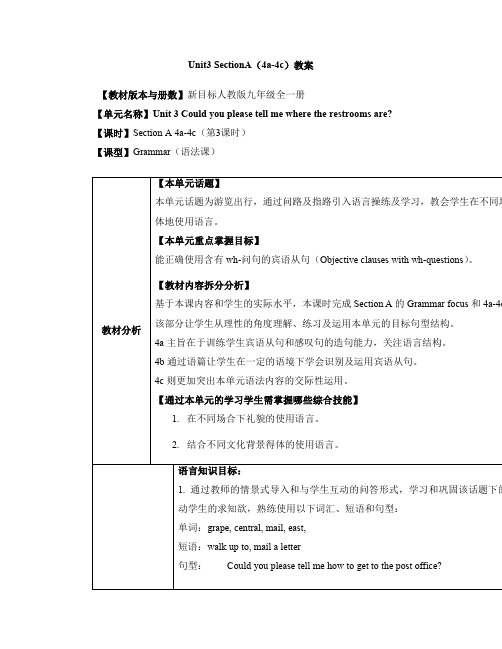
Could you tell me where I can buy some stamps?
Could you please tell me where I can get adictionary?
Do you know where I can get some magazines?
Excuse me, do you know where ____ _____ buy some medicine?
2.当然,顺着这条街有个超市。
Sure. There is a supermarket ____ the street.
3.请你告诉我怎样到邮局好吗?
Could you please tell me _____ ____ get to the post office?
Ask Ss to read the sentences in the column.
Let Ss to observe these sentence structure. Tell the students that today we will learn objectiveclauseswithwh-questions.
B. whose pen it was
C. whose pen it is
D. whose pen was it
Answers:DDBCCB
Function: Ask for information politely and follow directions
Ask:
1.Excuse me, can you tell me where the railway station is?
人教版九年级英语全册Unit3单元教学设计

3.讲解本章节的语法知识,如一般现在时、一般过去时和一般将来时的运用,结合具体实例进行剖析,让学生掌握语法规则。
4.教授描述人物性格、能力和成就的句型结构,引导学生运用到实际情境中。
(三)学生小组讨论
1.教师将学生分成若干小组,每组选择一个话题,如“我的偶像”、“我的梦想”等,进行小组讨论。
3.引导学生学会尊重他人,关爱同伴,形成良好的人际关系。
4.通过学习本章节,培养学生热爱生活、珍惜友谊的品质,使他们更加懂得感恩和回报。
5.激发学生对英语学习的兴趣,培养他们自主学习、终身学习的意识。
本章节教学设计以人教版九年级英语全册Unit3为基础,紧密结合学科知识,注重培养学生的英语核心素养。在教学过程中,教师需关注学生的个体差异,创设多样化的教学活动,激发学生的学习兴趣,帮助他们树立信心,为实现自己的人生目标而努力奋斗。同时,注重培养学生的情感态度和价值观,使他们在学习英语的过程中,形成健康、积极、向上的人生态度。
2.小组成员运用新学的词汇、短语和句型,描述话题相关的内容,提高口语表达能力。
3.各小组展示讨论成果,其他小组成员给予评价和建议,促进相互学习。
(四)课堂练习
1.设计听力练习,让学生听懂并获取有关人物经历、目标和计划的信息。
2.设计阅读练习,让学生通过阅读有关青少年成长的短文,获取关键信息,理解文章主旨。
3.合作学习,提高口语表达能力:组织小组讨论、角色扮演等活动,培养学生的合作意识和口语表达能力。在活动中,教师应引导学生积极参与,鼓励他们大胆开口说英语。
4.情境模拟,实践运用:设计贴近学生生活的情境,让学生在模拟真实语境中进行语言实践。如在教授“描述人物性格、能力和成就”的句型时,教师可以让学生模拟面试、演讲等场景,运用所学知识进行表达。
Units3-4教案.2023-2024学年人教版英语九年级全册

板书设计
①艺术性:
- 使用不同颜色的粉笔进行板书设计,如用蓝色粉笔书写过去进行时的构成,用红色粉笔标注重点难点。
- 利用图表、图片等元素,将过去进行时的用法以直观的方式呈现,例如用一个正在进行的动作的插图来表示过去进行时。
教学资源拓展
1.拓展资源:
(1)英语绘本:选择一些与过去进行时相关的英语绘本,如《The Cat in the Hat》等,让学生在阅读过程中感受过去进行时的运用,提高他们的语言素养。
(2)英语电影:推荐一些经典的电影片段,如《Back to the Future》、《The Godfather》等,让学生观看并分析其中过去进行时的运用,增强他们的语感。
3.成果分享:每个小组将选择一名代表来分享他们的讨论成果。这些成果将被记录在黑板上或投影仪上,以便全班都能看到。
五、总结回顾(用时5分钟)
今天的学习,我们了解了过去进行时的基本概念、重要性和应用。同时,我们也通过实践活动和小组讨论加深了对过去进行时的理解。我希望大家能够掌握这些知识点,并在日常生活中灵活运用。最后,如果有任何疑问或不明白的地方,请随时向我提问。
第一课时
步骤
师生互动设计
二次备课
教学方法与手段
教学方法:
1. 任务驱动法:通过设计具有挑战性和实际意义的任务,激发学生的学习兴趣和主动性,培养他们的语言能力和合作精神。例如,让学生分组讨论和编写关于过去进行时的故事,并在课堂上进行分享。
2. 情境教学法:通过创设真实、生动的情境,帮助学生理解和运用过去进行时。例如,利用图片、视频等材料,展示过去某个时刻正在进行的动作,引导学生用英语进行描述。
人教版九年级英语Unit3(第1课时)教学设计(英语教案)
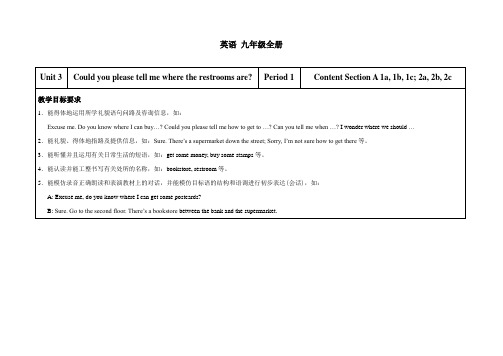
时间
4m
5
读图,了解对话情景—地点和谈论的话题。
教师询问几个学生:
Could you please tell me where the restrooms are?
Look at thepicture. Please watch and read.
Then, answer:
Where are they?
Check the answer.
16
进一步体验对话内容,总结有礼貌地问路和指路的句型,跟读对话中的句子,感受目标语言。
1.Watch and listen.
2.总结有礼貌地问路和指路的句型:
—Excuse me, could you please tell me …/
Excuse me, do you know where I can…
Now, look at the pictures and read the daily activities. Now, look at these daily activities and where can you do these things below?
核对1a任务的答案,学生进行自我评价(电子书可随机做出评价)。
时间
2m
3
导入新课话题
Let’s watch a picture.(播放图片)
Well, we’re going to learn Unit 3. Could you please tell me where the restrooms are?
4
引入单元标题
教师板书或课件显示:
Unit 3 Could you please tell me where the restrooms are?Period 1
人教版英语九年级全册Unit3 SectionB(2a-2e)优质课教案
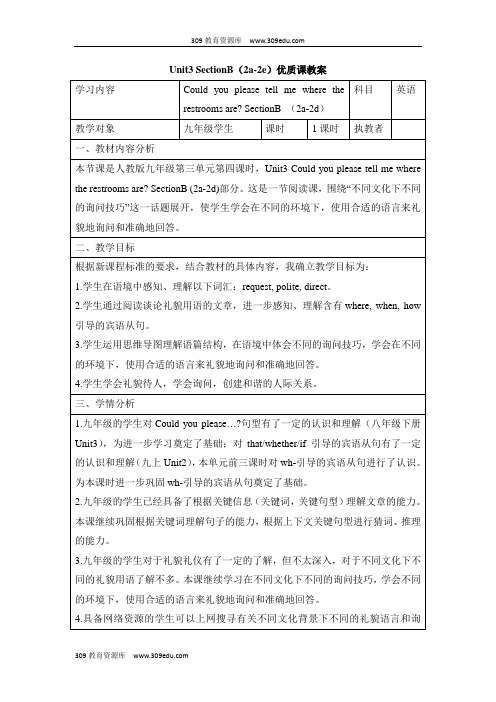
Unit3 SectionB(2a-2e)优质课教案requests?While ReadingSkimming:1. How many paragraphs are there in this passage?2. Please underline the topic sentence of each paragraph.Scanning:1. Read the first paragraph and choose the right answer.____sound less polite than ___. (A: Where are the restrooms? B: Could you please tell me where the restrooms are?)2. Guess the Chinese meaning of “direct”?3.引出思维导图:教师引导学生划分段落,画出每段的中心句。
教师引导学生抓关键信息,选择正确选项。
师引导学生猜出“direct”的意思。
教师引导学生理出思维导图的呈现过程。
学生根据阅读提示,划分段落,画出每段的中心句。
学生扫读第一自然段然后选择正确答案。
学生根据教师提示说出答案。
学生理清思维导图的思路。
Tip: The topicsentence isusually the______ orthe______sentence ofeach paragraph.Sometimes it isalso in the____ of theparagraph.目的是引出下面的思维导图。
Tip: Guess fromthe context.思维导图可以帮助学生理清文章思路和结构。
4. Read Para.2 and fill the table. Requests To whomWhen is theschool trip?Excuse me, MrWest. Do youknow when theschool trip is?5. Read Para.2 again and fill in the blanks: Good speakers change the way they speak in different situations. The expressions good speakers use might depend on ______or______.6.进一步完善思维导图:7. Watch a video What polite questions can you hear? 教师引导学生填表格。
人教版九年级英语第三单元教案
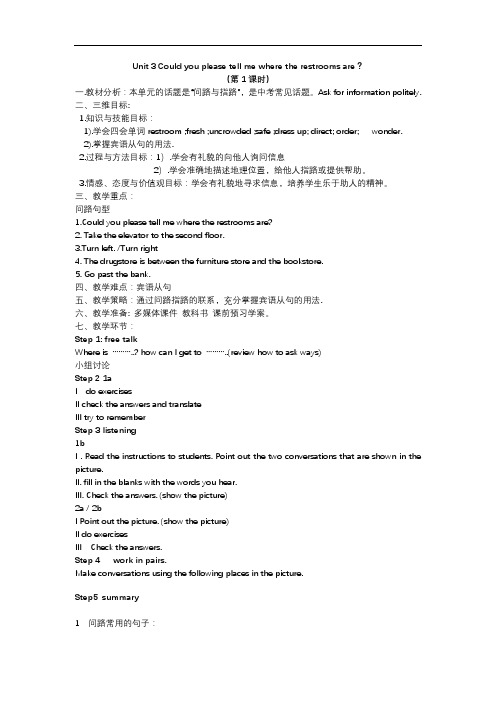
Unit 3 Could you please tell me where the restrooms are?(第1课时)一.教材分析:本单元的话题是“问路与指路”,是中考常见话题。
Ask for information politely.二、三维目标:1.知识与技能目标:1).学会四会单词restroom ;fresh ;uncrowded ;safe ;dress up; direct; order; wonder.2).掌握宾语从句的用法.2.过程与方法目标:1).学会有礼貌的向他人询问信息2).学会准确地描述地理位置,给他人指路或提供帮助。
3.情感、态度与价值观目标:学会有礼貌地寻求信息,培养学生乐于助人的精神。
三、教学重点:问路句型1.Could you please tell me where the restrooms are?2. Take the elevator to the second floor.3.Turn left. /Turn right4. The drugstore is between the furniture store and the bookstore.5. Go past the bank.四、教学难点:宾语从句五、教学策略:通过问路指路的联系,充分掌握宾语从句的用法.六、教学准备: 多媒体课件教科书课前预习学案。
七、教学环节:Step 1: free talkWhere is ………..? how can I get to ………..(review how to ask ways)小组讨论Step 2 1aI do exercisesII check the answers and translateIII try to rememberStep 3 listening1bI . Read the instructions to students. Point out the two conversations that are shown in the picture.II. fill in the blanks with the words you hear.III. Check the answers. (show the picture)2a / 2bI Point out the picture. (show the picture)II do exercisesIII Check the answers.Step 4 work in pairs.Make conversations using the following places in the picture.Step5 summary1 问路常用的句子:Do you know where …is ?Can you tell me how can I get to …?Could you tell me how to get to …?2 英语中表示方位的表达有:next to 贴近,靠近close to 在附近;on the left/right side在左/右边;in the middle of 在……的中间;in front of 在……的前面;between …and …在……之间;be opposite to 在……对面;across from 在……对面。
人教版英语九年级全册Unit3 Writing优质课教案

Unit3 Writing优质课教案教学目标〔Teaching objectives〕:1、知识与能力(Knowledge and ability objects): 礼貌地向他人询问信息和为他指路。
2、过程与方法(Method objects):观察周围环境并用恰当的语言去描述,师生对话,小组活动,借助多媒体和挂图来提高学生的主动性。
3、情感目标(Moral objects ):通过观察和指路,增进人与人之间的关系,学会做一个有爱心的人,关心身边的家人和朋友。
教学重点(The important point)1、The vocabulary: the way to…, turn right, across from, next to, go down/along, visit, at the gate2、Language:Would you please tell me the way to the post office? / Could you please tell me ...?教学难点(The difficult point ):Use the language to talk about direction.教学过程(Teaching procedures):Step 1 Warming-up and Leading in (4 mins)1、T: Boys and girls, please turn these phrases into English1、通往……的路2、乘出租车3、路过4、在……和……之间5、停车场,停车区6、在……的隔壁;在……的旁边7、百货商店8、期待Check the answers , call the Ss to read the answers.参考答案:1. the way to ...2. take a taxi3. pass by4. between …and…5. parking lot / car park6. next to…7. department store8. look forward to2、T: Fill in the blank with right phrases (4 mins)1、我很快乐你要来看望我的爸爸。
人教版英语九年级全册-Unit 3 SectionA (3a—3b)教案
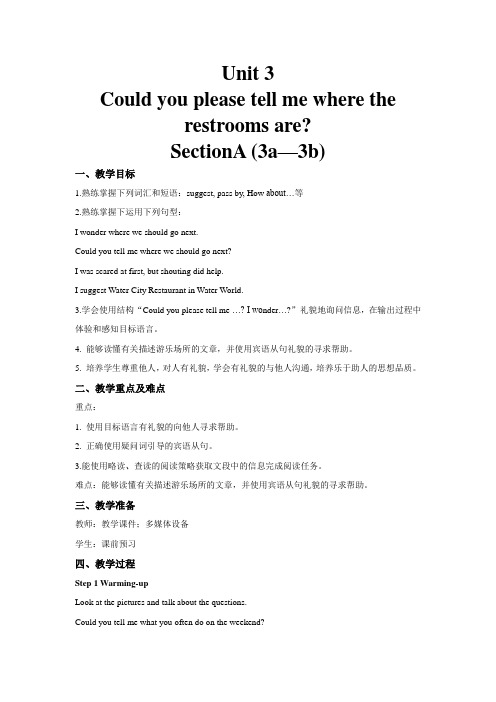
Unit 3Could you please tell me where therestrooms are?SectionA (3a—3b)一、教学目标1.熟练掌握下列词汇和短语:suggest, pass by, How about…等2.熟练掌握下运用下列句型:I wonder where we should go next.Could you tell me where we should go next?I was scared at first, but shouting did help.I suggest Water City Restaurant in Water World.3.学会使用结构“Could you please tell me …? I wo nder…?”礼貌地询问信息,在输出过程中体验和感知目标语言。
4. 能够读懂有关描述游乐场所的文章,并使用宾语从句礼貌的寻求帮助。
5. 培养学生尊重他人,对人有礼貌,学会有礼貌的与他人沟通,培养乐于助人的思想品质。
二、教学重点及难点重点:1. 使用目标语言有礼貌的向他人寻求帮助。
2. 正确使用疑问词引导的宾语从句。
3.能使用略读、查读的阅读策略获取文段中的信息完成阅读任务。
难点:能够读懂有关描述游乐场所的文章,并使用宾语从句礼貌的寻求帮助。
三、教学准备教师:教学课件;多媒体设备学生:课前预习四、教学过程Step 1 Warming-upLook at the pictures and talk about the questions.Could you tell me what you often do on the weekend?Have you ever been to an amusement park?What did you do there and what did you think of it?【设计意图】通过探讨学生熟悉的话题,引起学生的学习兴趣,并为3a教学活动做好铺垫。
人教版英语九年级全一册-Unit 3 Section B (2a-2d)教案

九年级Unit 3 Could you please tell me where the restrooms are?Section B 2a-2d Could you please...?教学设计Teacher :Analysis: This unit is about asking for information politely. This reading passage is telling us where should we need to make polite requests and how. Students have learned how to say politely in Section A and they will keep learning how to make polite requests in the reading passage. They will be interested in talking rudely and politely and compare with different ways of speaking. So the teacher will design these kinds of activities for them to learn better.Objectives:1. Language skillsStudents will be able to make polite requests according to different situations and different people.Students will learn how to make polite requests.Students will be able to rewrite impolite requests.2. Language knowledgeStudents will be grasp these new words and sentence structures, politely, request, direction, correct, polite, direct, speaker, impolite, Could you please...? May I ask...? Excuse me, I wonder if you can help me. I’m sorry to trouble you, but...Students will be able to speak politely, gently and slowly when making request.3. AffectsStudents will be able to choose and use suitable language based on cultural knowledge, such as in a foreign country, in public places, at school and at home.4. Cultural awarenessStudents will be able to learn to ask politely and pay attention to the body language and remember to say thank you.Students will learn not to ask rude questions, such as age, salary or use rude gestures.5. Learning strategyStudents will be able to realize the wrong ways they are using in daily life and correct them. Students will be able to get information from the pictures given from the passage.Focuses:Students will be able to choose and use suitable language based on cultural knowledge, such as in a foreign country, in public places, at school and at home.Students will be able to rewrite impolite requests.Difficulties:Students will be able to learn to ask politely and pay attention to the body language and remember to say thank you.Students will be able to realize the wrong ways they are using in daily life and correct them. Students will be able to get information from the pictures given from the passage.Teaching process:So let’s take a look at the structure of the passage. First paragraph, the writer leads in the topic. ...Step 3 Close-readingT: So what examples does the writer give us to lead in the topic? Request 1 VS Request 2Topic: When we visit a foreign country, we need to ask for help_________ and _________.T: How can we speak politely? What does a good speaker do? What examples does the writer give us as good speakers?When is the school trip?Excuse me, Mr. West. Do you know when the school trip is?T: Whom do we usually say it to?Why?Tip 1: Good speakers change the way they speak depending on__________________ and ___________________.T: How can we make questions longer and more polite?Could you please...?May I ask...?Excuse me, I wonder if you can help me.I'm sorry to trouble you, but.......Tip 2: Longer questions can be more ______ and we need to spend time ___________________before asking for help.PracticeWhat are you going to say to them if you are thirsty? Can you talk about it with your partner?What does the writer tell us in the end?Why do we need to speak politely? 细读阶段,通过找作者给出的例子一步步带出话题和make polite requests 的两个方法。
人教版英语九年级全册-Unit 3 Section B 3a—Self Check教案
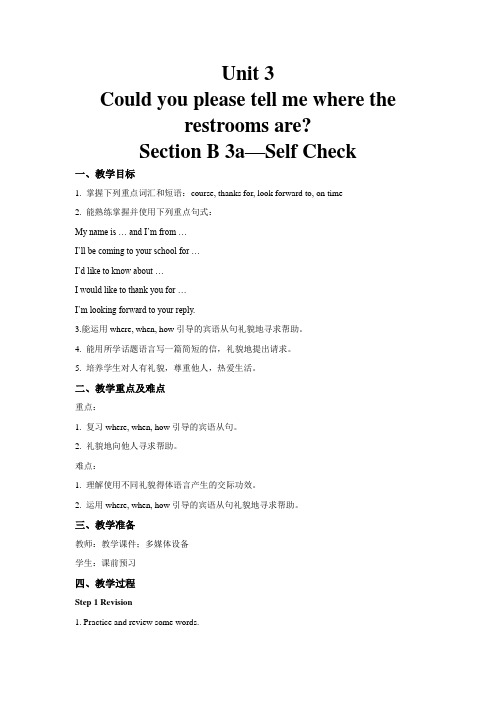
Unit 3Could you please tell me where therestrooms are?Section B 3a—Self Check一、教学目标1. 掌握下列重点词汇和短语:course, thanks for, look forward to, on time2. 能熟练掌握并使用下列重点句式:My name is … and I’m from …I’ll be coming to your school for …I’d like to know about …I would like to thank you for …I’m looking forward to your reply.3.能运用where, when, how引导的宾语从句礼貌地寻求帮助。
4. 能用所学话题语言写一篇简短的信,礼貌地提出请求。
5. 培养学生对人有礼貌,尊重他人,热爱生活。
二、教学重点及难点重点:1. 复习where, when, how引导的宾语从句。
2. 礼貌地向他人寻求帮助。
难点:1. 理解使用不同礼貌得体语言产生的交际功效。
2. 运用where, when, how引导的宾语从句礼貌地寻求帮助。
三、教学准备教师:教学课件;多媒体设备学生:课前预习四、教学过程Step 1 Revision1. Practice and review some words.2. Look and talk.T: Where’s the theatre?S1: …【设计意图】通过复习有关本单元话题的词汇,激发学生的学习兴趣。
同时通过讨论有关问路及礼貌的问询的话题,提高学生的口语表达能力。
Step 2Pre-writingThink and discussT:How to ask for information politely?S2: …Work on 3aWrite some polite, indirect questions about the topics.【设计意图】通过教材上的提示和同学多角度的回答,为3b写作奠定基础。
英语人教版九年级全册unit 3
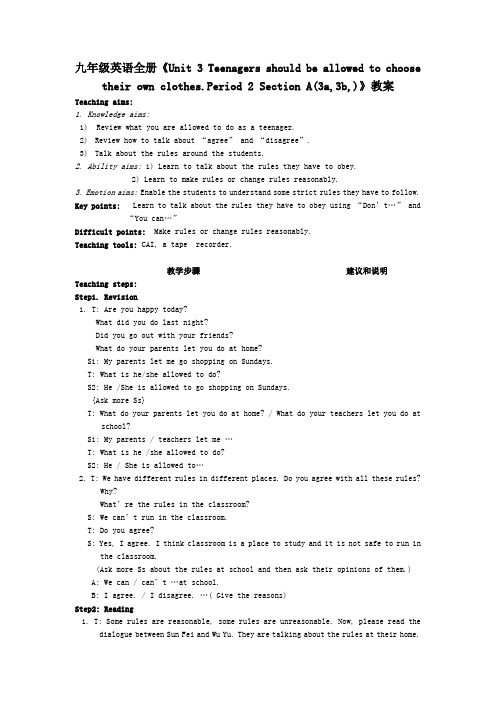
九年级英语全册《Unit 3 Teenagers should be allowed to choose their own clothes.Period 2 Section A(3a,3b,)》教案Teaching aims:1. Knowledge aims:1) Review what you are allowed to do as a teenager.2)Review how to talk about “agree” and “disagree”.3)Talk about the rules around the students.2. Ability aims: 1) Learn to talk about the rules they have to obey.2) Learn to make rules or change rules reasonably.3. Emotion aims:Enable the students to understand some strict rules they have to follow. Key points:Learn t o talk about the rules they have to obey using “Don’t…” and “You can…”Difficult points: Make rules or change rules reasonably.Teaching tools: CAI, a tape recorder.教学步骤建议和说明Teaching steps:Step1. Revision1. T: Are you happy today?What did you do last night?Did you go out with your friends?What do your parents let you do at home?S1: My parents let me go shopping on Sundays.T: What is he/she allowed to do?S2: He /She is allowed to go shopping on Sundays.{Ask more Ss}T: What do your parents let you do at home? / What do your teachers let you do at school?S1: My parents / teachers let me …T: What is he /she allowed to do?S2: He / She is allowed to…2. T: We have different rules in different places. Do you agree with all these rules?Why?What’re the rules in the classroom?S: We can’t run in the classroom.T: Do you agree?S: Yes, I agree. I think classroom is a place to study and it is not safe to run in the classroom.(Ask more Ss about the rules at school and then ask their opinions of them.) A: We can / can’t …at school.B: I agree. / I disagree. …( Give the reasons)Step2: Reading1. T: Some rules are reasonable, some rules are unreasonable. Now, please read thedialogue between Sun Fei and Wu Yu. They are talking about the rules at their home.After reading the dialogue, answer me some questions:1) Can Sun Fei go out on school nights?2) Can Sun Fei s tudy at a friend’s house?3) Who is allowed to go to the movies with friends on Friday?4) Does Sun Fei have to be at home by 10:00 p.m.?5) What isn’t Wu Yu allowed to do?2. Write their rules in the chart using “Don’t” and “You can”. (3a)Sun FeiWu YuDon’t go out on school nights.Don’t go out on school nights.You can study at a friend’s house.Step 3. PracticeRole play(3b)Cover the conversation in 3a and practice. Use the information in the chart.A: What rules do you have at home?B: Well, I’m not allowed to go out on school nights. How about you?A: I’m not allowed to go out on school nights, either. But I can study at a friend’s house.Step4. DiscussionDo you agree with the rules at their home? Why? Discuss in groups and then makea report.Report: At Sun Fei’s / Wu Yu’s home, she can / can’t… I agree / disagree. I think…Step5. Group work1.Do you like the rules at your home? What rules do you have at your home? (Asksome Ss to talk about their rules at home)The rules in the chart below are my friend’s rules at home.Talk to other students in the class and find three people who have to follow these rules in the chart.Find someone who…NameNameNamehas to stay at home on school nightsis allowed to stay up until 11:00 pmhas to get up early on weekendsis allowed to watch TV every nighthas to clean up his or her room every morning2.Do you like the rules in the chart? Do you want to make the rules by yourself?Work in groups and make rules that you like. You should give your reasons when you make the rules.You canDon’tAfter discussing, let some of them show their rules. Ask the reasons.Step5. Homework1. If you are the headmaster of the school or the chairman of the students union,make the rules.2. Write a report of your rules.In my school, / In my union, students can… Because I think…Bb design。
人教版九年级英语 Unit3 优质课教案(全)
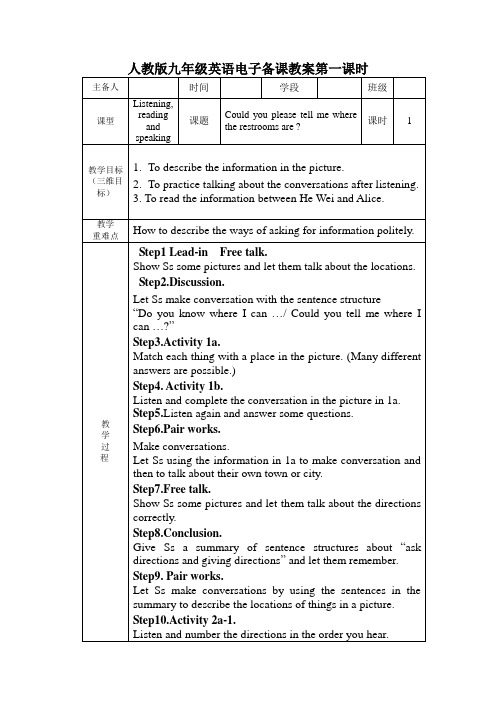
Step7.Free talk.
Show Ss some pictures and let them talk about the directions correctly.
nguage points:
explain the key words and phrases in section A-2
教学
反思
人教版九年级英语电子备课教案第三课时
时间
学段
班级
课型
Gou tell me where the restroom are ?
—Sorry,I’m not sure how to get there.
3.Iwonder where we should go next.
—You should try that new ride over there.
4.Could you tell us when the band starts playing this evening?
Step7.More exercises.
1.Choosing the right answers.
plete sentences.
3.Exchanges of sentence structures.
The exercises of Secondary School Entrance Exams
Step8.Conclusion.
Give Ss a summary ofsentencestructures about“ask directions and giving directions”and let them remember.
英语人教版九年级全册Unit3__SectionA(1a-1c)教案
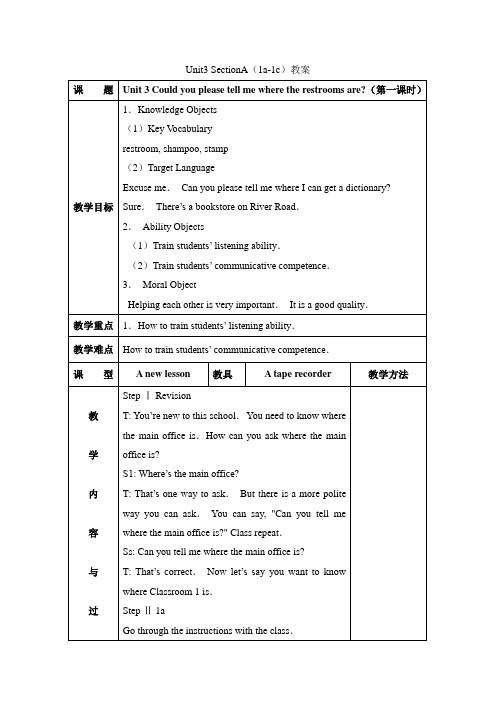
Unit3 SectionA(1a-1c)教案
课题
Unit 3 Could you please tell me where the restrooms are?(第一课时)
教学目标
1.Knowledge Objects
(1)Key Vocabulary
restroom, shampoo, stamp
教学难点
How to train students’ communicative competence.
课型
A new lesson
教具
A tape recorder
教学方法
教
学
内
容
与
过
程
Step Ⅰ Revision
T: You’re newto this school.You need to know where the main office is.How can you ask where the main office is?
Check the answers with the whole class.
Step Ⅳ 1c
Read the instructions to the class.
Point out thelist of things people need and the pictures of the places in activity 1a.Say.Look at activity la.Have a conversation with a partner.Ask your partner politely where you can do these thing and then answer your partner’s questions.
英语人教版九年级全册unit3 第一课时教案

Unit 3 Could you please tell me where the restrooms are?第一课时Section A(la-2d)◆知识目标A.重点单词:restroom,stamp,beside,postcard,pardon,bathroom,quick,rushB.重点词组:1. get to2. on one’s right/left3. turn left4. between ... and...5. go past6. a pair ofC.重点句式:1.Excuse me,could you tell me where I can get some money?2. Excuse me,could you please tell me how to get to the bookstore?3.Do you know when the bookstore closes today?4. Go to the second floor. There is a bookstore between the bank and thesupermarket.5 .But we haven’t even started yet!6 .I don’t mean a room for resting.◆能力目标学会问路以及指路的表达方法。
◆情感目标学会有礼貌地想别人提出请求并学会去帮助别人Step 1 Revision and Leading-in把教室当成超市,划分为若干区域,询问怎样到不同的区域购物。
T:Where is the…S:…T:How can I…S:…Step 2 SB Page 17完成教材上la-lc的任务。
1. la.学生看课本P17,la部分的街区图,按要求完成课本上相应的任务。
2. lb-lc.让学生听lb录音,完成插图中的句子,核对答案。
然后操练lc。
人教版九年级英语unit3教案
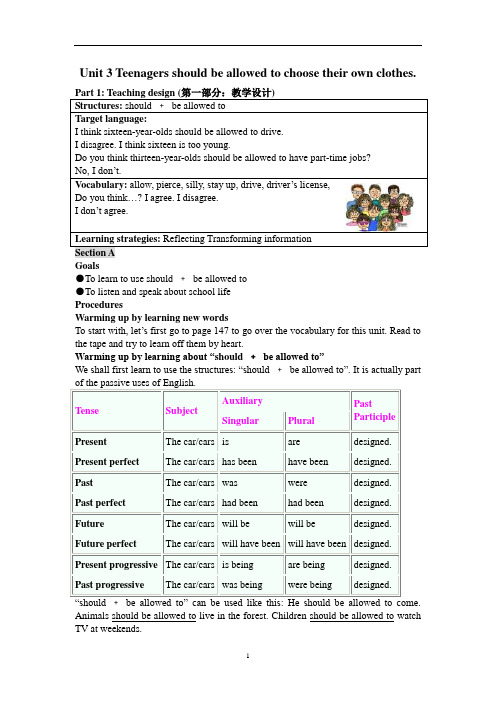
Unit 3 Teenagers should be allowed to choose their own clothes.Goals●To learn to use should ﹢be allowed to●To listen and speak about school lifeProceduresWarming up by learning new wordsTo start with, let’s first go to page 147 to go over the vocabulary for this unit. Read to the tape and try to learn off them by heart.Warming up by learning about “should ﹢be allowed to”We shall first learn to use the structures: “should ﹢be allowed to”. It is actually partAnimals should be allowed to live in the forest. Children should be allowed to watch TV at weekends.1a Reading and circlingFor practice of the “should ﹢be allowed to” r ead the statements in the box on page 18 and circle A for agree or D disagree.1b Listening and circlingListen and circle “T” for true or “F” for false beside the statements in the box on pageIn pairs look at the statements in activity 1a and makeconversation. You may use the phrases in the box on page 18A: I think teenagers should be allowed to go out with their friends.B: I agree. They are old enough.A: I think teenagers should be allowed to go to the mall with their classmates.A:I think teenagers should be allowed to get their driver’slicense.A: I think teenagers should be allowed to drive.A: I think teenagers should be allowed to get their ears pierced.A:I think teenagers should be allowed to watch TV at weekends.A: I think teenagers should be allowed to take the school bus.A: I think teenagers should be allowed to buy a new blouse at the mallA: I think teenagers should be allowed to choose their own clothes.B: I agree. They are old/ clever/ strong/ bright/ serious/ kind/ careful/ lucky/ enough. 2a Listening and checkingNext we are going to listen and check on page 19 what Kathy thinks. You may circleYou are going to listen again to the recording just now tonumber Kathy’s and Molly’s re asons in the correct order onpage 19.Next you are going to make in pairs a list of things teenagersshould and should not be allowed to do. Discuss your listwith your partner.A: Do you think teenagers should be allowed to drive?B: Yes, I think so.A: Do you think teenagers should be allowed to work late at night?B:No, I don’t think so. I don’t think they should be allowed to work late at night. They need to get enough sleep.A: Do you think teenagers should be allowed to disagree with their teachers?B: Yes, I think so.A: Do you think teenagers should be allowed to get tired doing their homework?B:No, I don’t think so.A: Do you think teenagers should be allowed to work every night?B: Yes, I think so.A: Do you think teenagers should be allowed to cut one’s hair?B: Yes, I think so. I kind of like my own style. It looks cool.A: Do you think teenagers should be allowed to have many friends?B:No, I don’t think so. They may meet bad people if they have too many friends. A: Do you think teenagers should be allowed to work on weekends?B: It depends on what they do. They may spend time with parents on weekends.3a Reading and writingYou are to read a dialogue between Sun Fei and Wu Yu on page 20.After reading you shall write in the chart Sun Fei’s and WuYu’s rules.Use “Don’t…” and “You can” to express your ideas.Jot down all the useful phrases form their dialogue.In pairs role play the conversation in 3a using the information in thechart on page 20.A: What rules do you have at home?B:Well, I’m not allowed to go out on school nights. How aboutyou?A:I’m not allowed to go out on school nights either. But I can watchTV with my sister.A: What rules do you have at school?B:Well, We’re not allowed to go out to movies on school nights. How about you?A:We’re not allowed to go out to movies on school nights either. But We can watch VCD with our teachers on the school playground.4 Doing groupworkTurn to page 20 and find someone in your group who has to g o home after school, who is allowed to stay up until 11:00 pm, who has to stay at home on school nights, who is allowed to watch TV every night, who had to clean up his room every morning.Write their names in the chart on page 20Closing down by reciting a kid poemAnother kid's poemThere is nothing under the bedOr on your closet floor,The monster is inside your headDon't worry anymore.It'll be there every nightIn your dreams to give you frightEvery time you turn off the lightAs long as you believe it.There is no monster on the stairsNor anywhere down the hallThis old house just settles at nightYou hear the creaks, that's allYou think you see a dragon peekThrough the window with a fang-ed beakAnd that's why you can't go to sleepAs long as you believe it.Mama loves you, daddy, tooAnd you will grow up tallNothing's going to happen to youWe'll take care of it all.You will be a fine young manA brave little boy who never ranWhatever you want to do, you canAs long as you believe it.So listen to me now, you poohIt's off to sleep right now with you.Daddy knows what you can doAs long as you believe it.SECTION BGoals●To read about rules of school●To talk about rules of schoolProceduresWarming up by talking about rulesHello, class. Are there any rules for us in this class? What are they? How were they made?Now list some of them and talk about them in pairs.1a Reading and checkingRead the questions on page 21 and write either “A” for always, “U” for usually, “S”In pairs you are to talk about your answers in activity 1a.I am going to play a dialogue to you. It is between a man and a boycalled Peter. They are talking about a math test. You are to listen andcircle the things in activity 1a you hear. While listening try to note theexpressions used.TapescriptListen again to the dialogue and match the sentence parts in the box onpage 21.Now copy down the expressions from the dialogue into your notebook.They are shown on the blackboard.2c Doing group workNext it’s reading time. Let’s read the article on page 22 and answer the questionsRole play a conversation using information from 3a.A:I think our school rules of always wearing school uniforms at school should be changed.B: Well, Mary and I talked about the rules the other day.A: At our school, we have to wear uniforms every day. That isbad for us.B: Yes, I agree. The problem is that all of us think the uniformsare ugly.A: I think young people should look smart and so we should beallowed to wear our own clothes.B: But our teachers believe that if we did that, we would concentrate more on our clothes than our studies.A: I disagree with them. We would feel more comfortable and that is good for studying. If we can't do that, we should be allowed to design our own uniforms. That would be a good way to keep both teachers and us happy.B:It’s also probably a good idea for parents to allow us to study in groups duringevening.A: I think so. I know we get noisy sometimes, but we learn a lot from each other.B: I also think that vacations should be longer.A:I agree with you on that. At present they're too short. Longervacations would give us time to do things like volunteering.B:Last summer I had an opportunity to volunteer at the localhospital, but I couldn’t because I had to go back to schools. It would be a good experience for me because I want to be a doctor when I'm older.A:Let’s go to talk to our teachers about the school rules after scho ol.B: OK! I agree with you!4 Making a list of rulesSuppose you and your friend are starting an English club. Make a list of rules aboutGet Up! Get Up!"Get up! Get up! Get out of bedyou lazy bum, you sleepyhead."Yes, that is what my mother saidat eight-oh-five today.She left the house and drove to work.She'll soon be feeling like a jerkwhen she finds out -- I have to smirk --Today is Saturday.--Kenn NesbittSELF CHECK1 Filling in blanksTo test your study this week you are to fill in each blank on page 23 with a correct word given. Change the form if it is necessary.2 Reading and writingYou are going to read the article on page 23 first and then write a letter to the editor agreeing or disagreeing. Explain your reasons.While you are reading cut the sentences into thought groups and underline the expressions.3. Helping and learningAt our school, we sometimes have a special day/ to help others. Last year/ we went to an old people’s home/ and sang songs/ and performed a play /for them. The old people were very happy. We should be allowed/ to take time/ to do things/ like that/ more often. For example, we should visit primary schools/ and help teach young students. I want to be a teacher/ when I'm older/ so it would be a great experience/ for me. Other students would like to do other jobs. For example, my friend Tian Ge wants/ to write for a newspaper. She should be allowed/ to volunteer/ at the newspaper office/ once a week. On Friday afternoons, many students are sleepy/ after a long week of classes. Some students should be allowed/ to have Friday afternoonsTo end this busy period we shall take time to learn and read aloud an English poem for kids.My FeetMy feet, my feet,I love my feet.I think they're great,I think they're neat.They're pretty, pink,and picturesque.They look so perfecton my desk.Unfortunately,sad to tell,they also havea funny smell.So though I'm fast,and though I'm fleet,and though at sportsI can't be beat,no team will pickme to compete,because they alwayssmell defeat.--Kenn NesbittReading: Should I be allowed to make my own decisions?Before you read, go over the new words for this part on 148.While you read, listen to the recording and underline all the expressions.Many teenagers have hobbies. But sometimes these hobbies can get in the way of schoolwork, and parents might worry about their child's success at school. Teenagers often think they should be allowed to practice their hobbies as much as they want. Do you agree?Liu Yu, a fifteen-year-old from Shandong, is a running star. He is in his school running team, and has always wanted to be a professional athlete. However, his parents won't allow him to train as much as he would like to. "Of course we want to see Liu Yu achieve his dreams,”says Mr Liu, “and we know how much he loves running. That's great, and my wife and I watched him in every one of his races. We have nothing against running! But we do think that our son needs to be realistic. Now he is getting older, he needs to think about what will happen if he doesn't become a professional runner in the end.”Liu Yu doesn't really agree. “Well, I think I should be allowed to make decisions formyself,”he says. “ My parents have always taught me the importance of working hard and not just to do what I enjoy. I understand this. But I'm serious about running. Being a professional runner is the only thing I have ever wanted to do.”Mr and Mrs Liu believe that Liu Yu should study hard in the evenings, and so they don't allow him to practice running on school nights. “I know this might seem strict,”says Mrs Liu, “but we think we're doing the right thing. He has to understand that very few people can become professional athletes. It's a very difficult dream to achieve. We don't allow him to practice every day because we think he needs to spend time on his homework.”But Liu Yu still doesn't agree. “I know my parents care about me,” he says. “But they are always talking about what will happen if I don't succeed. But I will succeed! I think I should be allowed to make this decision myself. Only then will I have a chance of achieving my dream.”After you read, read aloud the text again, to yourself, or to the tape and copy down all the expressions, too.Part 2: Teaching Resources(第二部分:教学资源)The Trouble with TeenagersPeople now care more about what teenagers are thinking about and feeling because they know there are hard moments in the life of teenagers.Varieties of troubles are seriously puzzling teenagers, such as hard study, the gap between parents and kids, relationship between themselves and their classmates, teachers and friends.Among them, the problem of "the generation gap" has become more and more obvious. The argument on this is widely spread. Different people hold different views. But we cannot fail to admit the fact that there are no hearts as delicate as those of teenagers, as everything is happening to them for the first time. Teenagers are certainly different from adults in many ways. They don't know the right way in which they can make everyone happy and satisfied. They are certainly lack of experience. That's why parents are always complaining about their being misunderstood. They say, they love their kids so much as to do everything for them. Is that the true love their children want? No, teenagers say, the true love which they long for should contain courage, correct guide and support instead of endless complaints about marks, marks, marks and strong pressure. So the teenagers are now even said to have been leading a harder life.The trouble with teenagers is that they haven't learned how to be controlled. Living life right down the middle, with all its attendant landmines, is all they know. It hasn't occurred to them to run in a zigzag pattern.They are more emotional than people think. If something serious happens to them, they will be deeply hurt. You can always hear the voice from a teenager that they haven't learned enough how to appear to be fine.The adults have recognized that they should show more care for the teenagers, especially their school life. Teenagers have their own special way of thinking.I have also got my own troubles. My grandpa passed away in September last year, which has greatly changed my life. He was even one of my best friends ever since I was born. He lived with my family for the past 18 years, the happiest time in his eyes.I have never admitted his death as a fact till now.Things which happened between us have come to my mind. All over again, I felt those powerful losses crisscrossing my own heart, and I know that when you say goodbye to a beloved grandparent, you say goodbye to something happy, something young in yourself. And that something never really returns and the pain never really goes away.No matter how hard a life the teenagers are leading, they will forever stand still and march forward straight and bravely.。
人教版英语九年级全册-Unit 3 SectionB (2a—2d)教案
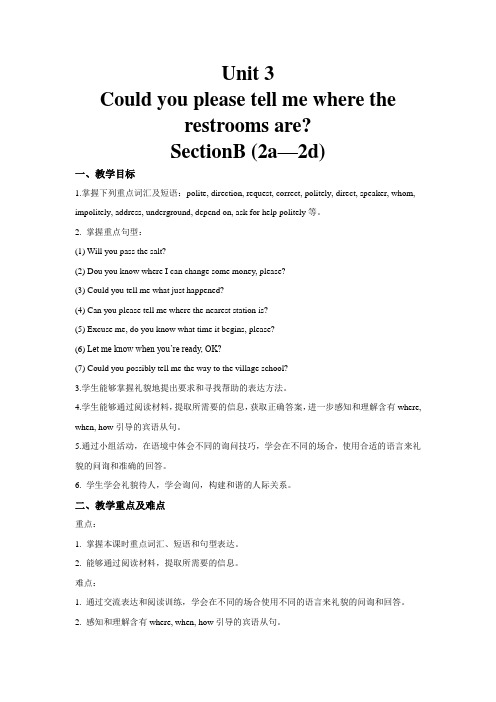
Unit 3Could you please tell me where therestrooms are?SectionB (2a—2d)一、教学目标1.掌握下列重点词汇及短语:polite, direction, request, correct, politely, direct, speaker, whom, impolitely, address, underground, depend on, ask for help politely等。
2. 掌握重点句型:(1) Will you pass the salt?(2) Dou you know where I can change some money, please?(3) Could you tell me what just happened?(4) Can you please tell me where the nearest station is?(5) Excuse me, do you know what time it begins, please?(6) Let me know when you’re ready, OK?(7) Could you possibly tell me the way to the village school?3.学生能够掌握礼貌地提出要求和寻找帮助的表达方法。
4.学生能够通过阅读材料,提取所需要的信息,获取正确答案,进一步感知和理解含有where, when, how引导的宾语从句。
5.通过小组活动,在语境中体会不同的询问技巧,学会在不同的场合,使用合适的语言来礼貌的问询和准确的回答。
6. 学生学会礼貌待人,学会询问,构建和谐的人际关系。
二、教学重点及难点重点:1. 掌握本课时重点词汇、短语和句型表达。
2. 能够通过阅读材料,提取所需要的信息。
难点:1. 通过交流表达和阅读训练,学会在不同的场合使用不同的语言来礼貌的问询和回答。
- 1、下载文档前请自行甄别文档内容的完整性,平台不提供额外的编辑、内容补充、找答案等附加服务。
- 2、"仅部分预览"的文档,不可在线预览部分如存在完整性等问题,可反馈申请退款(可完整预览的文档不适用该条件!)。
- 3、如文档侵犯您的权益,请联系客服反馈,我们会尽快为您处理(人工客服工作时间:9:00-18:30)。
Unit 3Could you please tell me where the restrooms are?教学设计知识目标课堂环节§自主学习案翻译下列词组。
1.买一些邮票buy__some__stamps2.得到关于……的信息get__some__information__about…3.打扰了excuse__me4.向左/右转turn__left/right5.经过书店go__past__the__bookstore6.在……和……之间between__…__and__…7.在左/右边on__the__left/right8.在那边over__there9.在二楼on__the__second__floor10.买一双鞋get__a__pair__of__shoes§课堂导学案Step 1 准备与热身(Preparation)Show pictures to the whole class, one student explains the places in English and another one who doesn't look at the blackboard guesses what place it is.For example, one student says: We can save money or exchange money in this place, another one guesses it is a bank.Get students to guesses the places like bank, post office, bookstore, museum, bathroom, washroom, mall and so on.T: You're new to this school.You need to know where the main office is.How can you ask where the main office is?S: Where's the main office?T: That's one way to ask.But there is a more polite way you can ask.Can you say some of them ?Students:__________________① Can you tell me where Classroom 1 is?② Could you tell me how to get to Classroom 1?……Step 2 呈现与输入(Presentation)1.要求学生翻开课本P17,要求学生查看1a下方的图片并与方框中所给动词短语的描述搭配起来。
(1分钟)2.检查答案,先要求全班一起给出答案并检查讨论。
(3分钟)参考答案:(Suggested answers:)shampoo: a or c information: d or emagazines: a or d writing paper: a or cdictionary: d stamps: etelephone call : a or e save money: b3.要求学生听第一遍录音,并完成课本上1a中图片上的对话内容。
(1分钟)听第二遍时,要求学生跟读对话并核对答案。
1.buy some stamps 2.post office3.Center Street 4.get a dictionary5.bookstore 6.Main Street4.完成教材1c的任务,要求学生模仿听力内容,使用1c方框中所给的对话介绍自己居住的城市。
并邀请2-3对同学当堂进行演示。
(3分钟)补全对话。
A: Excuse me! Could you please tell me where there is a good place to eat?B:__G__!There are many good restaurants here, what food do you like to eat?A: I like Italian food.B: We have two Italian restaurants.One is on the Main Street, named Green Land.__F__ , called Sally's.A: __C__?B: Sally's is a little nearer but it's expensive.Green Land is farther but the food is both delicious and cheap.A: Let's go to Green land! But__B__?B: Go down the street and turn left at the third crossing.Then you will be on the Main Street.You will see Green Land is between the post office and Milly's Café.A: __E__!A.Which is cheaper B.How can I get thereC.Which is nearer D.Sorry, I am new here, tooE.Thank you very much F.The other is next to the movie theatreG.Of course5.小结训练。
要求学生在规定的时间内完成一个小练习。
并请若干学生给出自己的答案。
有错误的及时解决纠正。
(2分钟)Step 3练习与体验(Practice)1.要求学生翻开课本P18。
播放录音一遍,给出所听到的指示方位的正确顺序。
(1分钟)2.要求学生听第二遍录音,在2a图片中画出男孩到超市的路线并逐句进行跟读。
(2分钟)Step 4 运用与生成(Production)3.放下听力材料,要求学生模仿2c听力内容,利用2a,2b的信息分角色练习对话并编作自己的对话。
然后邀请2-3对同学当堂演示。
看哪一对的表现最佳。
(5分钟) 4.播放2d的对话录音,让学生跟读,模仿并理解大意。
然后让学生分角色朗读并表演2d的对话。
(5分钟)5.对话内容巩固训练。
要求学生根据2d对话的内容完成下列各句。
完成后要求若干学生给出自己的答案。
以巩固对对话内容的了解。
(4分钟)用所给词的适当形式填空。
1.We don't need to__buy (buy) any stamps now by using the e-mail.2. He went up to the second (two) floor and buy some books.3. Could you tell me how to__get (get) to the post office?4. Do you know if there are any (some) public restrooms around here?5. There are many dictionaries (dictionary) in the shop.Step 5 巩固与提高(Progress)探究点一Do you know where I can get some information about the town?你能告诉我在哪里能找到有关这座城市的信息吗?information n.意为“信息,情报”,作不可数名词。
“一条信息”用“a piece of information”。
e.g.We have no information about where she has gone.关于她去了什么地方我们一点消息都没有。
针对训练1.Can you provide me with__some__information about the travel in Japan? (你能给我提供一些在日本旅游的信息吗?)探究点二Could you please tell me how to get to the bookstore?你能告诉我到书店怎么走吗?(1)“疑问句+to do”结构。
动词不定式前加上疑问代词what, which或疑问副词when, where, how构成特殊的不定式结构。
此结构可在句中充当主语、宾语、表语等。
e.g.I don't know what to do.(宾语)我不知道该干什么?How to go there is still a question.(主语)怎么去那里仍旧是个问题。
(2) Could you please…?意为“请你……好吗?”,也可用Can you please …?替换。
后接动词原形,是表示有礼貌地请求的交际用语。
但用could比用can语气更委婉。
【拓展】表示有礼貌地请求的句式还有:①Would you please do sth.?②Would you like to do sth.?③Would you mind doing sth.?e.g.Could you please tell me where the nearest bank is?你能告诉我离这儿最近的银行在哪里吗?Would you mind opening the window?你介意我打开窗户吗?针对训练2.When__to__leave__for__London (什么时候前往伦敦)has not yet been decided.3. I'm very upset and don't know what__to__do(该做什么).4. He is not sure who__to__choose (选谁).5. Could__you__tell__me (你能告诉我)the way to the railway station?Step 6 家庭作业(Homework)1.编一个有关自己的城市或居住地的对话。
2.完成本单元学生用书第一课时的练习。
§教学反思:______第二课时Section A(3a~4c)教学设计知识目标课堂环节§自主学习案翻译下列词组。
1.加油,过来come__on2.握住我的手hold__my__hand3.听起来完美sound__perfect4.Bob叔叔的餐馆Uncle__Bob's__restaurant5.在去……的路上on__the__way__to…__6.路过,经过pass__by7.摇滚乐队a__rock__band8.买些药buy__some__medicine9.沿着大街go__along__the__street10.我不确定I'm__not__sure11.中心图书馆Central__Library§课堂导学案Step 1 准备与热身(Preparation)通过多媒体向学生展示一组娱乐公园的图片,借机向学生提问:Have you ever been to a fun park? Did you have a good time there? Can you show me how to get there? 展示图片,学生讨论,导入生词和短语。
